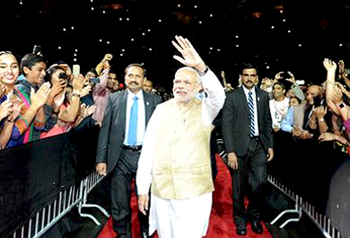New Delhi, Sep 28: Congress on Monday hit back at Prime Minister Narendra Modi for his barbs at the party in the US, saying they were "ashamed" of his behaviour on foreign soil.

"In our country it doesn't take much for allegations to come up against politicians... Someone made 50 crores, someone's son made 250 crores, (someone's) daughter made 500 crores, (someone's) damaad (son-in-law) made 1000 crores..." he said. Countering Modi, Congress leader Manish Tiwari said, "Indians are fed up with the government who helps a 'baghoda'.
Is there any state government in India like Rajasthan where there are scams after scams. Before taking a dig at others, he should look at his party," he said. JD(U) leader K C Tyagi also took a dig at Modi, saying, "Questions can also be raised as to why he does not stay with his mother". He said the Prime Minister should never attack his country's opposition in the foreign land.
Alvi said he had written to Modi after Lok Sabha polls, saying "You say your mother works even today. Then why are you not caring for your mother. Is your salary less that you cannot take care of your mother?"
Modi had on Sunday got emotional while talking about the sacrifices his mother made as he grew up.





Comments
Add new comment